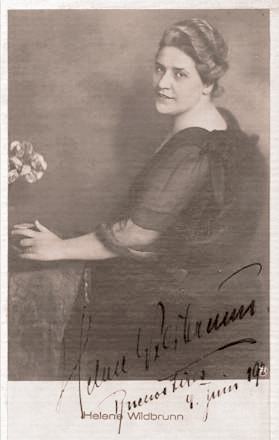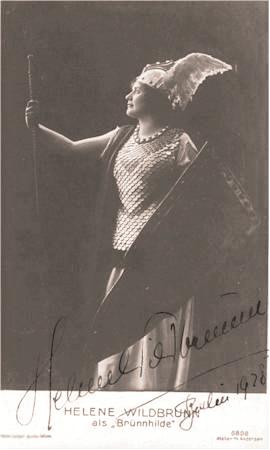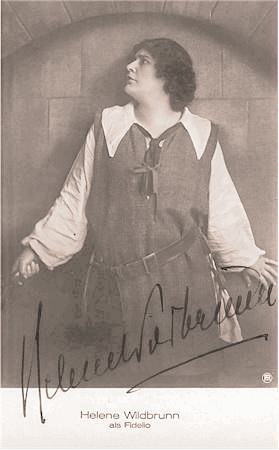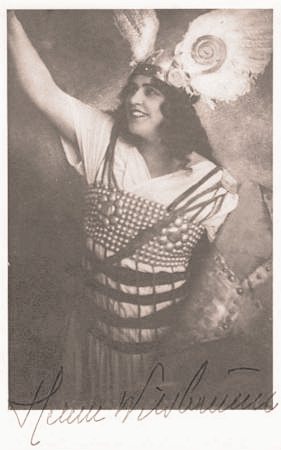Austrian soprano, 1882 - 1972
(courtesy of Charles B. Mintzer) Biographical notes:
She was a pupil of Rosa Papier-Paumgartner at the Conservatory “Gesellschaft der Musikfreunde,” who had previously taught Lucie Weidt and Anna Bahr-Mildenburg. At the
beginning of her career she sang contralto and mezzo roles and made her debut at the Municipal Theatre in Dortmund in 1907. In one season she sang twenty-three roles! Having married her
tenor partner Karl Wildbrunn, she gradually began to take over the soprano repertoire but even in 1913 she still sang Waltraute, Erda, Fricka and Brangäne. In the following year she was
engaged to the opera house in Stuttgart and she concentrated chiefly in the dramatic Wagner repertory where she stayed for five years. Her subsequent roles were Rezia, Amelia, Leonore,
Brünnhilde in Siegfried and Götterdämmerung, Valentine in Les Huguenots, Kundry and the Marschallin. From 1918 she was a member of the Berlin State Opera and in 1925 at the City
Opera where she shared the dramatic roles with Margarete Bäumer
. In 1919 she sang at the Vienna State opera for the first time and returned there until 1932. Felix Weingartner invited
her for the 1922 season at theTeatro Colón in Buenos Aires. She was also invited to La Scala where she appeared as Kundry. She sang all three Brünnhildes there with a cast that included
Lotte Lehmann, Walter Kirchhoff, Emil Schipper and Carl Braun. A benchmark of her career was when Max von Schillings entrusted her with the role of Isolde. She was regarded as one of the most outstanding
Hochdramatische of her era. In the 1920s she appeared in Zurich, Paris, Budapest and Amsterdam. Her favorite conductors were Max von Schillings and Leo Blech. She
also appeared under Franz Schalk, Karl Muck, Ettore Panizza, Bruno Walter and Richard Strauss. She remained a member of the Vienna State Opera ensemble until 1932. In 1927 she sang Leonore
is a splendid cast opposite Fritz Krauss, Lotte Schöne and Paul Bender under the direction of Bruno Walter. Obviously she did not impress the critics, they described her voice being in decline
(she was 39 years old!). After 1932 she sang occasionally in opera and concerts. She became a Professor at the Vienna Musical Academy from 1932 until 1950.
(courtesy of Charles B. Mintzer)
(courtesy of Charles B. Mintzer)
(courtesy of Charles B. Mintzer)
Comment:
Helen Wildbrunn belongs to the great dramatic sopranos of the 20th century. It is a pity that she made comparatively few recordings.
Her voice was remarkable for its dark color. Her chest register was fully developped and in this, she reminds me of Her recordings of Wagner are outstanding and represents her great art. She sings this music with warmth, drama, humanity and intimacy,
a rare combination indeed... Isolde’s Mild und leise, Brünnhilde’s Ewig war ich, ewig bin ich and Starke Scheite schichtet mir dort
are records for “the desert island”. Helene Wildbrunn had a vast repertory, listen to her in arias of Santuzza, Amelia and Tosca (in German and Italian!). Wonderful. My favorite recordings: - Mild und leise (Isolde in Tristan und Isolde / Wagner / Gramophone 1919) - Als euer Sohn einst fortzog (Santuzza in Cavalleria rusticana / Mascagni / Gramophone 1919) - Vissi d’arte (Title role in Tosca / Puccini / Gramophone 1919)
- Der Tod sei mir willkommen (Amelia in Un Ballo in Maschera / Verdi / Gramophone 1922) - Ozean, du Ungeheuer (Rezia in Oberon / Weber / Gramophone 1923) - Starke Scheite schichtet mir dort auf (Brünnhilde in Götterdämmerung / Wagner / Gramophone 1924)
My warmest thanks to Charles B. Mintzer
|
|||||||||||||||||||



